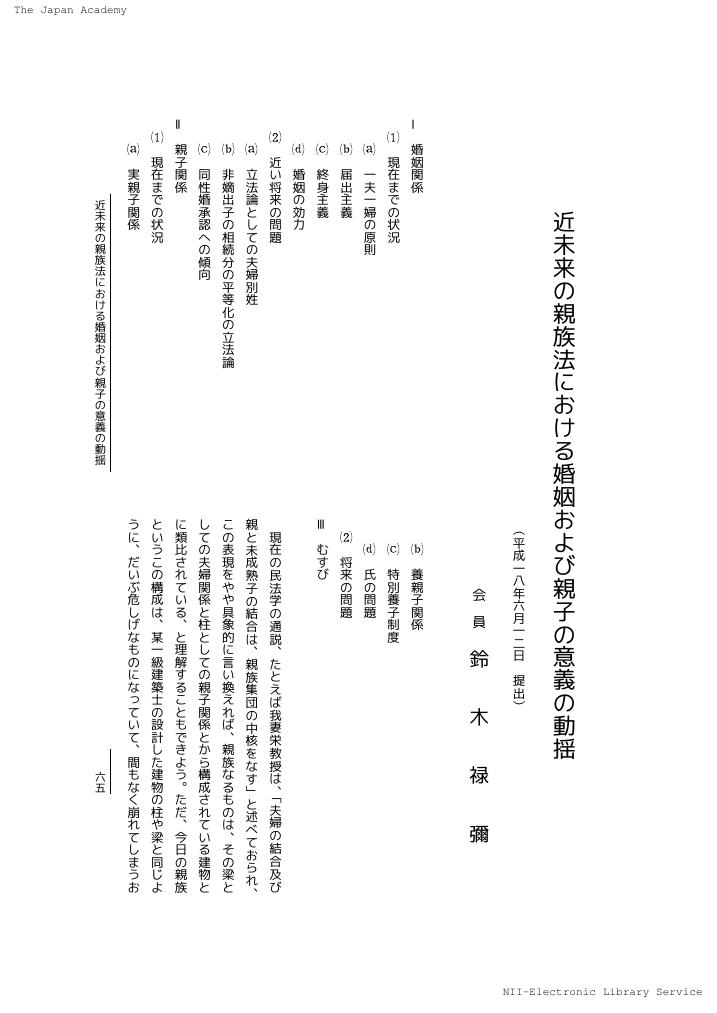4 0 0 0 OA 一民法学者の放浪記
- 著者
- 鈴木 禄彌
- 出版者
- 北海道大学大学院法学研究科
- 雑誌
- 北大法学論集 (ISSN:03855953)
- 巻号頁・発行日
- vol.55, no.6, pp.233-266, 2005-03-18
3 0 0 0 IR 一民法学者の放浪記
- 著者
- 鈴木 禄彌
- 出版者
- 北海道大学大学院法学研究科
- 雑誌
- 北大法学論集 (ISSN:03855953)
- 巻号頁・発行日
- vol.55, no.6, pp.233-266, 2005-03-18
2 0 0 0 近未来の親族法における婚姻および親子の意義の動揺
- 著者
- 鈴木 禄彌
- 出版者
- 日本学士院
- 雑誌
- 日本學士院紀要 (ISSN:03880036)
- 巻号頁・発行日
- vol.61, no.2, pp.65-79, 2007
1 0 0 0 成年後見制度と高齢者保護
- 著者
- 鈴木 禄彌
- 出版者
- 日本学士院
- 雑誌
- 日本學士院紀要 (ISSN:03880036)
- 巻号頁・発行日
- vol.57, no.1, pp.1-15, 2002
As the elderly increase in the Japanese population, the government, on the one hand, has enacted a series of statutes to provide care for the elderly. Adult Guardian Laws, passed in April 2000, are typical examples of the statutes of this kind. On the other hand, however, the restoration of fiscal balance, the primary objective in the present policy of the Japanese government, causes marked reduction of the budget for elderly care. Perceiving this change of governmental policy, a recent Senryu* verse goes as follows:“Ye elderly, die please-for the sake of thy country”. True to this verse, the elderly will not be able to sustain their lives, if the contemporary fiscal policy is pushed further. One may even say that this policy seeks the demise of Japanese elder generation. How would the government answer this criticism? How should we, the seniors, cope with this present situation? In this paper, I would like to ask this question to my colleagues. *Senryu is a traditional Japanese satirical verse of 17 syllables the genre of which in Edo era.
- 著者
- 鈴木 禄彌
- 出版者
- 日本学士院
- 雑誌
- 日本學士院紀要 (ISSN:03880036)
- 巻号頁・発行日
- vol.55, no.2, pp.67-79, 2000
There have been opposing views on several issues regarding the House Lease Law in recent years. One view is based on the idea that the house lessees are economically disadvantaged people. This idea originates from the miserable life of house lessees in Edo era (referred to as “uratanagari”). It supports the present legal system which provides legal protections for house lessees. The other view challenges this idea and supports a revision of the present legal system aimed at reducing such legal protections. [Chapter 1]<br>With the societal changes that took place in Meiji era, the standard of living of house lessees improved gradually. Furthermore, the Civil Code of 1896 and House Lease Law of 1921 provided several rules for the protection of house lessees. After the revision of the House Lease Law in 1941, it became practically impossible for the owner of a house to terminate the tenant's lease contract without“just cause.”With this revised statute, the agreement of the lease period was practically of no legal effect. [Chapter 2]<br>An improvement of economic conditions in the Postwar Period brought about an elevation in the living standard of house lessees. Against this background, a proposal was made to establish tenancy for a specific number of years. The parties to a house lease contract would agree on the number of years of tenancy. This period would be specified in the contract and the lease would terminate upon its expiration. Accordingly, a“just cause”would not be necessary to terminate the lease. Proponents of this proposal persuaded politicians of the ruling party to back it and succeeded in passing it into law in 1996. [Chapter 3]<br>Under the Japanese Civil Code, the interest of the mortgagee of a real property take priority over that of the lessee if the mortgage is registered before the implementation of the lease contract. There is an exception to this principle in the case of:“short-term leases.”The lessee of a real property who meets certain requirements (as a short-term lessee) need not vacate the leased property even if the mortgage is foreclosed, the property is auctioned, and the vendee demands the lessee to vacate the leased property. Since a short-term lessee is not always a disadvantaged person, the rationale of legal protection for such a lessee is at issue. As this privilege of the short-term lessee is often abused by gangstars and others and causes a disturbance in real estate financing, many influential scholars support its abolition. Others argue, however, that abolishing this privilege would harm the innocent lessees. They are trying to devise compromising solutions. This argument is still unsettled. [Chapter 4]<br>Finally, large construction firms that plan urban redevelopment projects urge landowners to build high-rise buildings on their land, as an investment. Under this scheme, when the landowner builds a building, he leases it to the construction firm. The construction firm, in turn, subleases rooms of the building to sublessees. The difference between the rent paid and earned becomes the profit of the construction firm. In this case, the construction firm is surely a lessee of the building. Therefore, some scholars support the application of the House Lease Law to this type of lease. It is against the spirit of the House Lease Law to allow legal protections to such a big business, however. Thus, more than a few scholars reject the validity of applying this Law to this type of lease. Many cases involving this issue are now under litigation. [Chapter 5]<br>Underlying these various legal issues are opposing ideas as to whether or not it is appropriate to regard house lessees as economically disadvantaged people and allow them legal protections. Finding a settlement to these opposing ideas is the most difficult problem to solve.
1 0 0 0 OA 討論
1 0 0 0 OA 近未来の親族法における婚姻および親子の意義の動揺
- 著者
- 鈴木 禄彌
- 出版者
- 日本学士院
- 雑誌
- 日本學士院紀要 (ISSN:03880036)
- 巻号頁・発行日
- vol.61, no.2, pp.65-79, 2007 (Released:2017-04-05)
